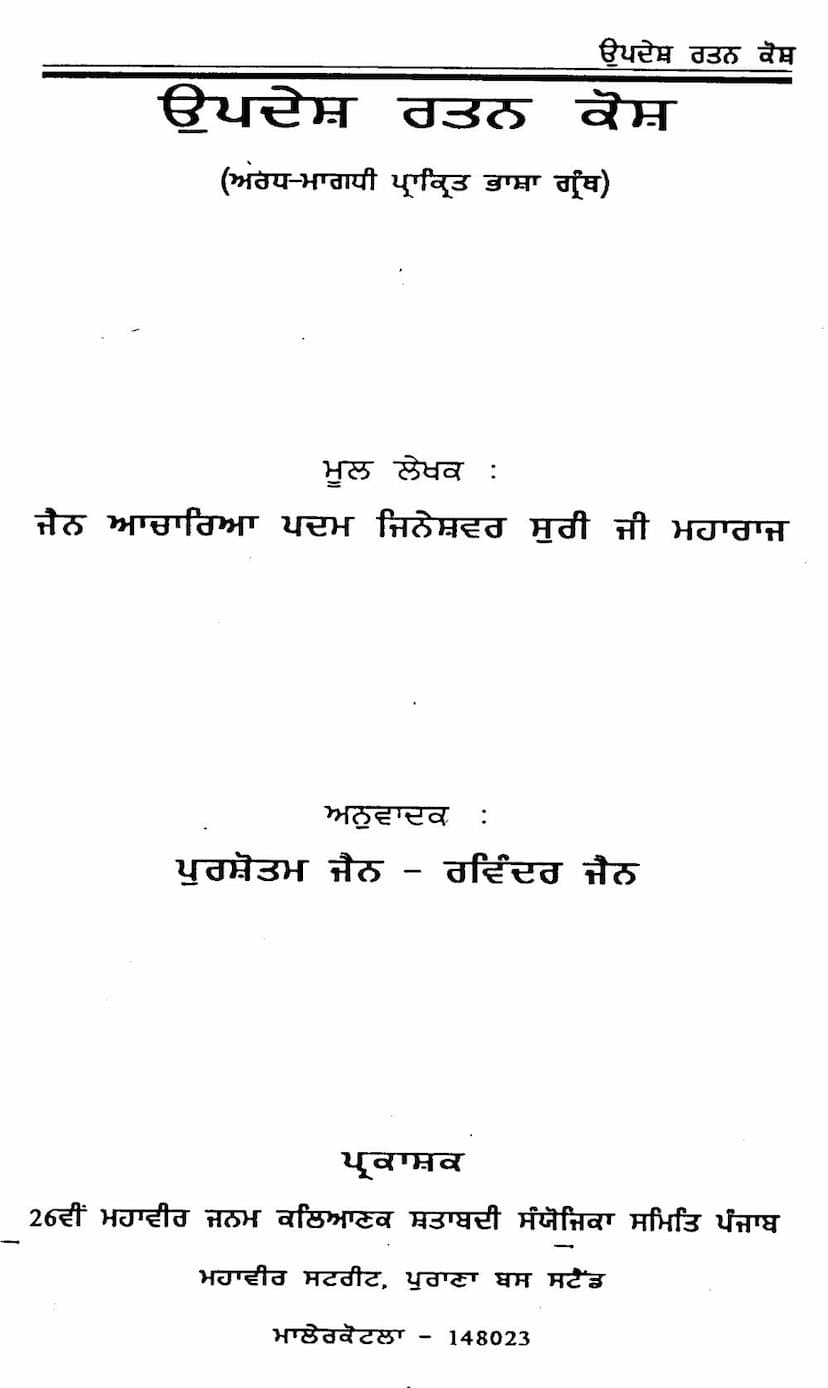Updesh Ratna Kosh
Added to library: September 2, 2025

Summary
Here's a comprehensive summary of the Jain text "Updesh Ratna Kosh" based on the provided pages:
Book Title: Updesh Ratna Kosh (Treasury of Counsel) Original Author: Acharya Padam Jineshwar Suri Ji Maharaj Translators/Publishers: Purushottam Jain, Ravindra Jain Language of Original Text: Ardha-Magadhi Prakrit
Overall Theme: "Updesh Ratna Kosh" is a compilation of valuable teachings and guidance, presented as a string of pearls (a treasury of jewels) for the betterment of life. The text emphasizes ethical conduct, spiritual development, and the core principles of Jainism. It aims to provide practical advice that leads to inner peace, success, and ultimately, liberation.
Key Teachings and Concepts:
-
Invocation and Reverence: The book begins with a traditional Mangalacharan (auspicious invocation), paying homage to Lord Mahavir. This highlights the importance of seeking blessings and purity before embarking on any significant task or teaching.
-
The Essence of Dharma (Religion):
- Compassion for All Living Beings (Jiv Daya): This is identified as the foremost secret of Dharma. It encompasses non-violence (Ahimsa) and empathy, understanding that all beings desire to live.
- Control Over the Senses (Indriya Nigraha): Subduing desires related to sight, smell, taste, touch, and sound is crucial. The mind, intellect, and soul work together, and the senses are powerful tools that need to be guided by intellect to avoid negative actions.
- Speaking the Truth (Satya Vachan): Truthfulness leads to a peaceful life and serves as an ideal for others. Lying erodes trust. However, the text cautions against speaking harsh truths that might hurt someone's feelings, suggesting alternatives like using names or titles of respect.
-
Character and Conduct:
- Maintaining Purity of Character (Sheel): One should always keep their character pure and avoid association with those who lead a life of misconduct.
- Respecting the Guru's Words: The words of the Guru are paramount and should be followed. The Guru is depicted as Brahma, Vishnu, and Shiva in the world.
- Demeanor and Behavior: Modesty in movement, avoiding ostentatious displays, and not casting sideways glances are important. These qualities protect one from criticism and defamation.
- Control Over the Tongue: The tongue is identified as the root of many disputes. Careful speech is essential to avoid conflict and regret.
- Upholding Family Traditions (Kul Karma): One should not abandon their ancestral customs.
- Avoiding Harmful Speech and Actions: Refrain from speaking ill of others, making false accusations, and losing one's temper. These actions lead to conflict and negativity.
- Benefiting Others: The teachings advocate for doing good deeds, remembering the help received from others, and supporting those in distress.
- Self-Praise and Criticism of Others: Avoid boasting about oneself and do not speak ill of bad people, as it can damage one's reputation.
- Maintaining Equanimity: Neither excessive laughter nor excessive sorrow is advisable. One should strive for a balanced state of mind.
-
The Path to True Happiness and Success:
- Wisdom in Action: Think before you speak and act. Rash decisions lead to problems.
- Integrity and Trust: Do not trust enemies, do not provoke those who trust you, and avoid being ungrateful or disloyal. These are the principles of the path of righteousness.
- Appreciating Good Qualities: Recognize and appreciate good qualities in everyone, regardless of whether they are friends or foes.
- Avoiding Selfish Relationships: Stay away from relationships that are not based on genuine affection.
- Discernment: Exercise caution and assess the suitability of people and situations before engaging in friendships, business, or receiving advice.
- Fearlessness: Acting with integrity, avoiding improper actions, and making decisions after careful consideration leads to a fearless life.
- Patience and Perseverance: Do not become disheartened during difficulties. Maintain faith and practice your principles even in the face of death or loss of wealth.
- Managing Attachments: Avoid excessive attachment to worldly pleasures and relationships. Do not get angry with loved ones. Resolve conflicts peacefully.
- Avoiding Negative Company: Stay away from bad company. Be open to learning from everyone, even children, and shun injustice.
- Contentment and Humility: Do not be engrossed in wealth, nor be arrogant. Be content even in times of scarcity. Humility and contentment are the keys to lasting happiness.
- Respecting Others: Do not disrespect anyone. Do not boast about your own virtues. Avoid the influence of desires and attachments.
- Gradual Progress: Start with small tasks and gradually progress to larger ones. Achieve qualifications without arrogance.
- Meditation on the Divine: Meditate on the Tirthankaras (liberated souls) who are free from attachment and aversion.
- Equanimity and Non-Attachment: Treat all beings as you would treat yourself. Avoid attachment (Raag) and aversion (Dvesh). This is the path to breaking the cycle of birth and death.
-
The Nature of True Greatness:
- Secrecy in Subordinates' Virtues: Keep the good qualities of servants or employees confidential to maintain their focus and your respect.
- Openness with Children's Virtues: Publicly acknowledge and praise the good qualities of your children to foster their devotion and responsibility.
- Discretion Regarding Women: Be discreet about the virtues and flaws of women. Praising their beauty can arouse negative desires in others, while revealing flaws can lead to their astray.
- The Power of Positive Actions: The text emphasizes that true influence and attraction (Vashikaran) come from speaking kindly, showing humility, practicing charity, and embracing the virtues of others.
Concluding Message: The book concludes by stating that those who internalize and live by these teachings will attain liberation (Moksha), true spiritual happiness, and prosperity. The teachings are presented as a valuable necklace that brings these three benefits. The ultimate goal is to break free from the cycle of birth and death by cultivating these virtues and following the path laid out by the enlightened ones.